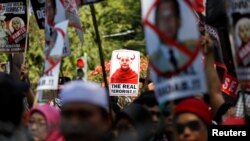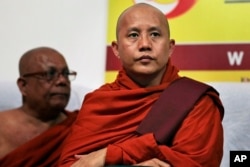U.N. human rights experts investigating a possible genocide in Myanmar said Monday that Facebook had played a role in spreading hate speech there.
Facebook had no immediate comment on the criticism Monday, although in the past the company has said that it was working to remove hate speech in Myanmar and kick off people who shared such content consistently.
More than 650,000 Rohingya Muslims have fled Myanmar's Rakhine state into Bangladesh since insurgent attacks sparked a security crackdown last August. Many have provided harrowing testimonies of executions and rapes by Myanmar security forces.
The U.N. human rights chief said last week he strongly suspected acts of genocide had taken place. Myanmar's national security adviser demanded "clear evidence."
Marzuki Darusman, chairman of the U.N. Independent International Fact-Finding Mission on Myanmar, told reporters that social media had played a "determining role" in Myanmar.
"It has ... substantively contributed to the level of acrimony and dissention and conflict, if you will, within the public. Hate speech is certainly, of course, a part of that. As far as the Myanmar situation is concerned, social media is Facebook, and Facebook is social media," he said.
U.N. Myanmar investigator Yanghee Lee said Facebook was a huge part of public, civil and private life, and the government used it to disseminate information to the public.
"Everything is done through Facebook in Myanmar," she told reporters, adding that Facebook had helped the impoverished country but had also been used to spread hate speech.
"It was used to convey public messages, but we know that the ultra-nationalist Buddhists have their own Facebooks and are really inciting a lot of violence and a lot of hatred against the Rohingya or other ethnic minorities," she said. "I'm afraid that Facebook has now turned into a beast, and not what it originally intended."
The most prominent of Myanmar's hardline nationalist monks, Wirathu, emerged from a one-year preaching ban Saturday and said his anti-Muslim rhetoric had nothing to do with violence in Rakhine state.
Facebook suspends and sometimes removes anyone that "consistently shares content promoting hate," the company said last month in response to a question about Wirathu's account.
"If a person consistently shares content promoting hate, we may take a range of actions such as temporarily suspending their ability to post and, ultimately, removal of their account."






